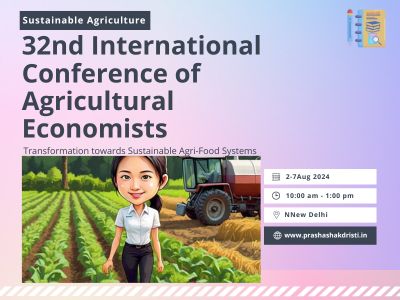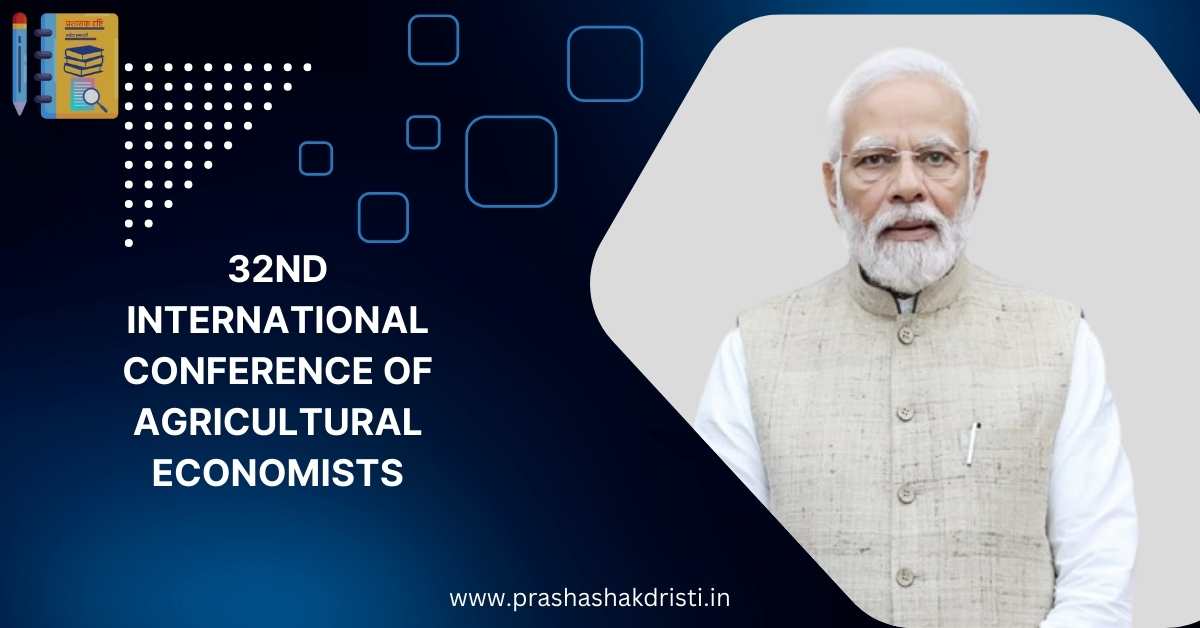Prime Minister inaugurated the 32nd International Conference of Agricultural Economists (ICAE) at the National Agricultural Science Centre (NASC) campus in New Delhi.
32nd International Conference of Agricultural Economists | ICAE

This year’s 32nd International Conference of Agricultural Economists theme is “Transformation towards Sustainable Agri-Food Systems.” The focus is on sustainable agriculture amidst global challenges like climate change, resource depletion, rising production costs, and conflicts. About 1,000 delegates from 75 countries attended the event.
The triennial conference, organized by the International Association of Agricultural Economists, is being held from August 2 to 7, 2024, in India after 65 years. The theme “Transformation towards Sustainable Agri-Food Systems” focuses on sustainable agriculture amidst global challenges. The conference aims to showcase India’s agricultural research and policy progress and foster partnerships between research institutes and universities. It provides a platform for young researchers and professionals to present their work and network globally. The event was attended by around 1,000 delegates from 75 countries.
A Historic Event in India
In his address, Prime Minister expressed his happiness that the ICAE is being held in India after 65 years. He welcomed the dignitaries on behalf of India’s 120 million farmers, including over 30 million women farmers, 30 million fishermen, and 80 million livestock farmers. “You are on a land that has over 500 million livestock. I welcome you to India, an agricultural and livestock-loving country,”
India’s Ancient Agricultural Traditions
Prime Minister highlighted India’s ancient agricultural traditions and the priority given to science and logic. He mentioned the medicinal properties of food grains and referred to ‘Krishi Parashara,’ a nearly 2,000-year-old agricultural treatise. Modi emphasized that agriculture in India has evolved from this rich heritage, supported by a strong system of agricultural research and education. He noted that ICAR boasts over 100 research institutes, over 500 colleges, and more than 700 Krishi Vigyan Kendras.
Diverse Agricultural Practices
India’s diverse agricultural practices were highlighted, showcasing the importance of its 15 agro-climatic zones. The Prime Minister noted that agricultural produce changes every hundred kilometers, emphasizing the country’s diverse farming practices. He said this diversity is crucial for global food security, making India a beacon of hope.
India’s Journey from Food Scarcity to Food Surplus
Recalling the last ICAE held in India 65 years ago, Modi noted that India was a newly independent nation facing food security challenges. Today, India is a food surplus country, the largest producer of milk, pulses, and spices, and the second-largest producer of food grains, fruits, vegetables, cotton, sugar, tea, and fisheries. He emphasized that India’s experience is valuable for discussions on food system transformation, benefiting the Global South.
Commitment to Global Well-Being
Prime Minister reiterated India’s commitment to global well-being through ‘Vishwa Bandhu.’ He mentioned India’s vision for global well-being with mantras like ‘One Earth, One Family, One Future,’ ‘Mission Life,’ and ‘One Earth One Health.’ He underlined India’s holistic approach to addressing challenges in sustainable agriculture and food systems.
Agriculture at the Core of Economic Policies
PM emphasized that agriculture is central to India’s economic policies. He noted that 90% of India’s small farmers, owning little land, are the backbone of the country’s food security. He pointed out that a similar situation exists in many developing countries in Asia, making the Indian model suitable. Modi highlighted natural farming, sustainable, and climate-resilient farming initiatives, and the government’s focus on research and development related to climate-resilient crops. He mentioned 1,900 new climate-resilient varieties developed in the last decade, including rice varieties requiring 25% less water and black rice as a superfood.
Addressing Water Scarcity and Climate Change
Prime Minister acknowledged the challenges of water scarcity and climate change. He presented Shree Anna, Millet, as a solution due to its minimal water requirement and high yield. Modi expressed India’s desire to share its coarse grain basket with the world, noting the celebration of the International Year of Nutritious Cereals last year.
Modern Technology in Agriculture
The Prime Minister discussed connecting agriculture with modern technology through initiatives like the Soil Health Card, solar energy farming, the e-NAM digital agriculture market, Kisan Credit Card, and the PM Crop Insurance Scheme. He also highlighted the formalization of agriculture and allied sectors, promoting agricultural startups, natural farming, and farm-to-table concepts. Modi noted that 90 lakh hectares of land have been brought under micro-irrigation in the last decade. He mentioned India’s progress towards 20% ethanol blending, benefiting both agriculture and the environment.
Leveraging Digital Technology

Modi emphasized leveraging digital technology in agriculture through the PM Kisan Samman Nidhi, transferring money to 10 crore farmers’ bank accounts with a single click. He mentioned digital crop surveys providing real-time information to farmers and aiding data-based decisions. Modi also discussed land digitization, giving farmers a digital identity number for their land, and promoting drones in farming with ‘Drone Didis’ trained to operate them. He noted that these steps will benefit India’s farmers and strengthen global food security.
Conclusion
Concluding his address, Prime Minister Modi noted the presence of many young attendees and expressed confidence that the next five days would foster global connections in sustainable agri-food systems. He said, “We will learn from each other and teach each other.”
You can read also – PLI scheme

